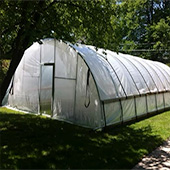What’s the hoopla about the hoop house?
 This year’s Brady Scholars chose to support local food networks by building the 20 feet by 36 feet hoop house structure containing 12 full-size planter boxes behind the Institute for Policy Research (2046 Sheridan Rd). A hoop house is an easy-to-construct indoor planting system, not unlike a greenhouse, that allows for longer cultivation periods of vegetables and fruits. Hoop houses use the sun’s energy to heat and trap moisture for optimal growing throughout the year.
This year’s Brady Scholars chose to support local food networks by building the 20 feet by 36 feet hoop house structure containing 12 full-size planter boxes behind the Institute for Policy Research (2046 Sheridan Rd). A hoop house is an easy-to-construct indoor planting system, not unlike a greenhouse, that allows for longer cultivation periods of vegetables and fruits. Hoop houses use the sun’s energy to heat and trap moisture for optimal growing throughout the year.
The hoop house will grow a variety of vegetables such as tomatoes, beets, green beans, squash, and zucchini to sell at local farmers markets. The funds earned will go towards hoop house upkeep as well as purchasing additional supplies. To maintain the hoop house, the Brady Scholars have partnered with Wild Roots (who already have a garden at the Norris University Center south lawn) and the Evanston nonprofit, New Leaf Urban Garden, which employs young Evanston community members. The project was funded by the Northwestern Sustainability Fund (NSF) and mulch was donated by City of Evanston.
The hoop house will teach NU students and Evanston Township High School students about food cultivation through peer learning, while operating a self-sustaining year-round urban garden. Jordan Woll, a Brady Scholar involved with the project, states, “The goal is to increase healthy food practices and environmental awareness among NU students and Evanston at-risk youth.” The scholars hope that urban gardening will continue to grow in the Chicagoland area, with the help of educating NU and Evanston students.
The Ethics and Civic Life Brady Scholars program is made up of NU students, “who are looking for a deeper understanding of ethical, social, and political questions, and who are eager to learn about and contribute to their local civic community.” Last year, the Brady Scholars planted 70 plum and pear trees to create a "food forest," in Eggleston Park in Evanston. This projects’ goal is to tackle economic marginalization in West Evanston community by creating a robust and vibrant local produce market run by at-risk youth.